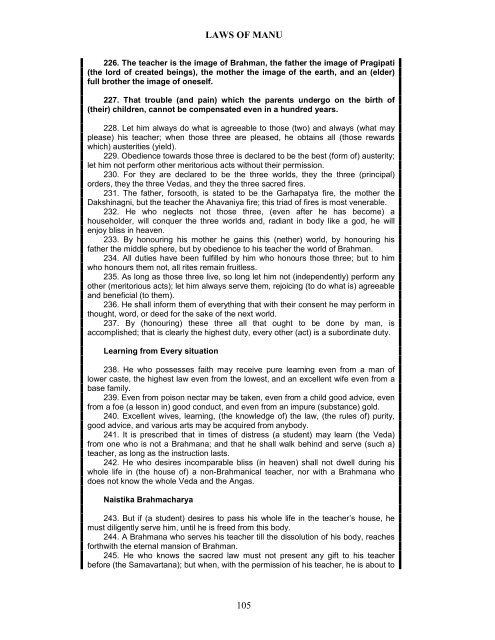You also want an ePaper? Increase the reach of your titles
YUMPU automatically turns print PDFs into web optimized ePapers that Google loves.
LAWS OF MANU<br />
226. The teacher is the image of Brahman, the father the image of Pragipati<br />
(the lord of created beings), the mother the image of the earth, and an (elder)<br />
full brother the image of oneself.<br />
227. That trouble (and pain) which the parents undergo on the birth of<br />
(their) children, cannot be compensated even in a hundred years.<br />
228. Let him always do what is agreeable to those (two) and always (what may<br />
please) his teacher; when those three are pleased, he obtains all (those rewards<br />
which) austerities (yield).<br />
229. Obedience towards those three is declared to be the best (form of) austerity;<br />
let him not perform other meritorious acts without their permission.<br />
230. For they are declared to be the three worlds, they the three (principal)<br />
orders, they the three Vedas, and they the three sacred fires.<br />
231. The father, forsooth, is stated to be the Garhapatya fire, the mother the<br />
Dakshinagni, but the teacher the Ahavaniya fire; this triad of fires is most venerable.<br />
232. He who neglects not those three, (even after he has become) a<br />
householder, will conquer the three worlds and, radiant in body like a god, he will<br />
enjoy bliss in heaven.<br />
233. By honouring his mother he gains this (nether) world, by honouring his<br />
father the middle sphere, but by obedience to his teacher the world of Brahman.<br />
234. All duties have been fulfilled by him who honours those three; but to him<br />
who honours them not, all rites remain fruitless.<br />
235. As long as those three live, so long let him not (independently) perform any<br />
other (meritorious acts); let him always serve them, rejoicing (to do what is) agreeable<br />
and beneficial (to them).<br />
236. He shall inform them of everything that with their consent he may perform in<br />
thought, word, or deed for the sake of the next world.<br />
237. By (honouring) these three all that ought to be done by man, is<br />
accomplished; that is clearly the highest duty, every other (act) is a subordinate duty.<br />
Learning from Every situation<br />
238. He who possesses faith may receive pure learning even from a man of<br />
lower caste, the highest law even from the lowest, and an excellent wife even from a<br />
base family.<br />
239. Even from poison nectar may be taken, even from a child good advice, even<br />
from a foe (a lesson in) good conduct, and even from an impure (substance) gold.<br />
240. Excellent wives, learning, (the knowledge of) the law, (the rules of) purity,<br />
good advice, and various arts may be acquired from anybody.<br />
241. It is prescribed that in times of distress (a student) may learn (the Veda)<br />
from one who is not a Brahmana; and that he shall walk behind and serve (such a)<br />
teacher, as long as the instruction lasts.<br />
242. He who desires incomparable bliss (in heaven) shall not dwell during his<br />
whole life in (the house of) a non-Brahmanical teacher, nor with a Brahmana who<br />
does not know the whole Veda and the Angas.<br />
Naistika Brahmacharya<br />
243. But if (a student) desires to pass his whole life in the teacher’s house, he<br />
must diligently serve him, until he is freed from this body.<br />
244. A Brahmana who serves his teacher till the dissolution of his body, reaches<br />
forthwith the eternal mansion of Brahman.<br />
245. He who knows the sacred law must not present any gift to his teacher<br />
before (the Samavartana); but when, with the permission of his teacher, he is about to<br />
105


















